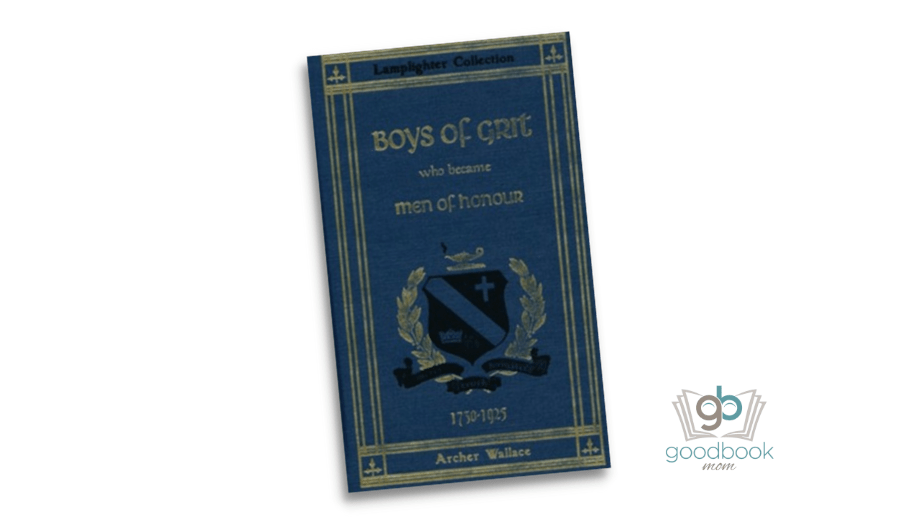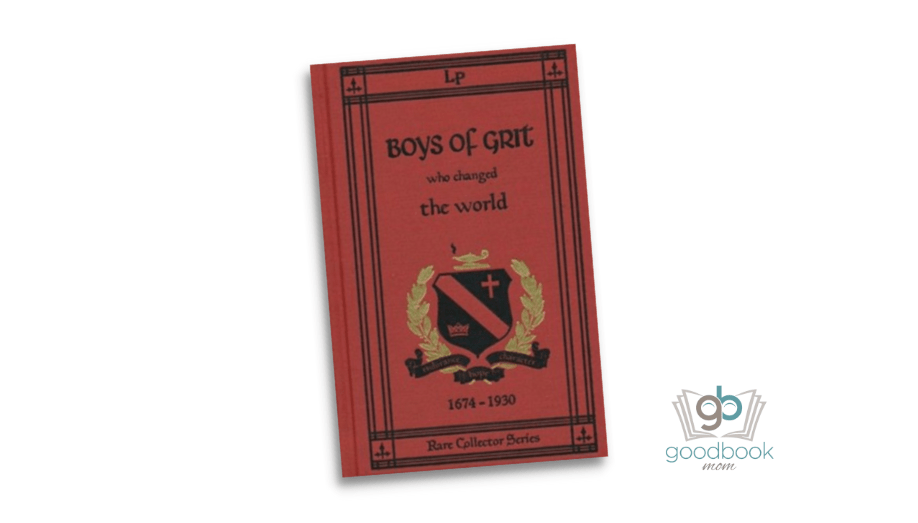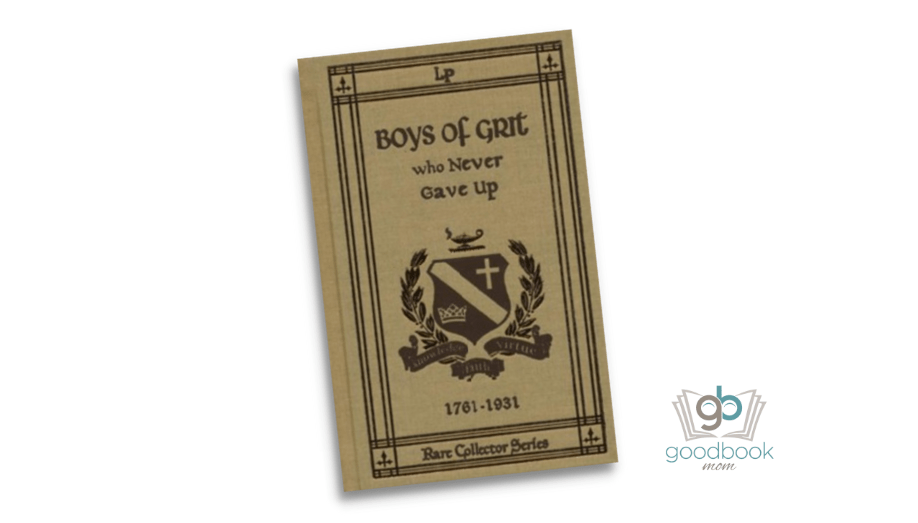
Summary
The Boys of Grit series span over three books, detailing the lives of seemingly ordinary boys who became inspiring men of great character. Each book contains roughly 15 biographies of different men in a chapter book format.
The first book, Boys of Grit Who Became Men of Honour, encompasses the lives of selected boys circa 1730 – 1925, who had lowly or ordinary upbringings. Due to their passion, drive, industrious nature, and tenacity, they set out to achieve and accomplish great things. Many of the men gave everything to have an education and accounted for every second to work towards bettering their circumstances.
The second book, Boys of Grit Who Changed the World, highlights biographies of boys who lived during 1674 – 1930 and ended up having a profound impact on the world around them. In keeping with the theme, many if not all, were disadvantaged but worked tirelessly and against all odds to overcome great opposition in order to follow their passions and better others surrounding them.
The last book, Boys of Grit Who Never Gave Up, is filled with stories of true grit and unparalleled perseverance in the face of adversity. These are tremendous stories of young boys who took every moment captive, never lost sight of the prize, and no matter what, would not give in or give up.
Reading Level: Ages 10+
Read Aloud Age: 9+
Mom Thoughts
Some of the themes I enjoyed about these books are work ethic and time appropriation. The boys mentioned in these books would work tirelessly for their families and fill their downtime furthering their passions or learning. Of course, most of these biographies were written prior to child labor laws which are a great, protective measure, but hearing how these young boys seized every moment conveyed to the reader just how valuable education, serving God, or whatever their passion was to them.
In our modern culture, a standout from this series is courage in convictions despite opposition. Most of the biographies were of boys who were told their ideas would not succeed but pressed on anyway. In some instances, they did not know where their next meal would come from or failed tons of times, but pressed on anyway. This notion, though not necessarily spiritual, can encourage kids who struggle with being different, facing opposition, lack grit, or have to make a stand for Christ in today’s culture.
To that end, another aspect I enjoyed was portraying boys who did not fit the gender mold. In today’s culture, if one does not fit rigid stereotypes, they are advised to transition to the opposite gender. However, these books have examples of young boys who honored God in their masculinity while being who God created them to be. For instance, Josiah Wedgeworth was an exceptional creative type, James Jerome Hill used his free time to engage in watercoloring instead of folly, John Wanamaker never was one for sports but engaged in reading, and Luther Burbank loved flowers and cacti as a boy and became a naturalist.
One thing to note is the biographies focus on, “mentor men,” not necessarily Christian men. Most of the biographies focus on secular men who may or may not have had a relationship with God, oftentimes alluding to the nominal Christian duties of the time (e.g. church attendance, family Bible reading, etc.) that impacted the boys’ lives without stating their view on God. Hans Christian Anderson is also featured who has incurred speculation in modern days of how his faith interacted with his homosexual inclinations. The biographies that focus on men who impacted the world for Christ are phenomenally written and were a joy to read. They do a wonderful job of portraying a regenerated life and a life wholly devoted to Christ. Lamplighter Publisher addresses these points in the preface of book three writing, “Whenever man is the object of emulation, we must be discerning whether following Christian or non-Christian mentors, we can learn from their success as well as their failures.”
There are a few things that give me pause. First of all, most biographies have some sort of traumatic event that could upset young readers (see examples below). In addition, other things that could be upsetting is the lack of child labor laws (a 5-year-old sleeping only from 8 pm – 1 am), children having to do things in life they do not want to (which is very counter-cultural today), and authority figures being harsh, unkind, and abusive at times.
The last but largest issue that needs to be addressed is that of race. Lamplighter Publisher states in the preface, “The contents of this book may contain some stereotypical phraseology that is not in the viewpoint held by Lamplighter. However, in order to help our readers to understand the thinking of the day and to accurately depict that period of history, we have chosen to leave these portions of the texts as they were written.” While I completely understand this, readers will most likely need a conversation regarding all people being made in God’s image, all people being of one race but different ethnicities, and how to glorify God in referring to other image-bearers. Obviously, we do not use the language listed below, so it would be fitting to have conversations as to why and how we can address one another in a God-honoring way. Every biography that contains these terms is not disparaging in any way and truly lifts up the remarkable young men, but this area certainly needs parental guidance and nuanced conversation.
Language:
Period-Specific Language (most of these terms have footnotes to define the term as they were
used during their time periods):
Intercourse for reciprocal communication, hoes for farming, coons for raccoons, ass for donkey; handicapped used frequently as life’s obstacles or physical disadvantages, retarded as in slowed velocity of electricity, gay/gaily for happy, school-specific for “deaf-mutes.”
Dated saying: ”sight of an organ-grinder with a monkey” could not distract him.
Dated Ethnic-Specific Terms:
Slave, slave boy, negro, negro boy, young negro, negroes, colored children, colored boys, colored students, colored people, colored man, black boys, master and mistress (female version of master). Footnoted that Booker T. Washington preferred to refer to his peers as
Negroes with a capital “N” as a race designation as opposed to “members of the colored race.” Also included in Washington’s biography was that the children got their food like “dumb animals,” his mother did not know one member of her race that could spell, and, “he always succeeded in raising the white man’s idea of the colored people.” Southland as a geographical term.
Indians to mean Native Americans, “red men” to mean Native Americans, Edward Bok called “Dutchy,” tailor was a “Jew,” “half-savages” of Tripoli during WW2, Oriental countries as a geographical term, William Carey wanted to serve the “neglected heathen.” Rodney “Gypsy” Smith’s biography denotes how gypsies had a reputation for dishonesty and Smith’s parents were “very much the same as members of their own tribe.”
General Language:
“He looked like a worthless tramp,” Edison’s dad thought him to be “stupid/a dunce,”
John Muir was the “runt of the family,” Isaac Watts only a little taller than a “dwarf.”
Questionable Behaviors:
Kitto’s dad had “intemperate” habits.
James Flanaghan’s father was a “beast when drunk. The house would be smashed to
atoms and the family driven out.”
James Flanaghan worked in the coal mines and the others would curse, tease him, use
vile language, and tell stories of the saloon the night before. Flanaghan started going to
saloons and singing there which pleased the drunk patrons.
James Flanaghan held a job modeling tobacco pipes prior to the coal mines.
Edward Bok was bullied for being Dutch.
Walter Scott wrote in his diary, “I often wish I could lie down to sleep without waking.”
Sexual Content:
In keeping with the time period, Josiah Wedgeworth’s love interest was his cousin, and they ended up marrying.
Other Things to Note:
Traumatic Life Events:
Many boys experienced traumatic life events but still persevered in the midst of adversity. Here are some examples of such that might be hard for young, empathic readers to understand:
Josiah Wedgeworth’s limb had to be amputated.
John Kitto lost his hearing while falling off a 35-foot ladder.
Henry Fawcett had a heartbreaking accident where his father shot a partridge but a stray bullet hit his eyes, rendering him blind at 25 years old.
While working on a train, the conductor boxed young Edison’s ears so severely that his hearing was forever destroyed in one ear.
Paderewski’s mom died and his dad was arrested and taken to Siberia, leaving him and his sister alone.
Walter Scott was going lame and his grandfather thought killing a sheep and swathing him in it would cure him of lameness.
Robert Babcock and his brother were playing with gunpowder, and it exploded in Robert’s face, permanently blinding him.
Franz Joseph Haydn’s relative with which he lived was stern and thrashed/flogged him when he should have been fed. The wife was even meaner and neglected him; he was on the verge of starvation multiple times.
William Hickling Prescott went to Harvard at 15 and during lunch, someone threw bread on accident and hit his eye. He went blind in one eye from a detached retina and the other became inflamed, so he had to suffer through long periods of darkness in his room for the rest of his life.
Harsh Teachers:
John Kitto was treated cruelly by the schoolmaster because he was deaf/mute.
Henry Jones’ schoolmaster was cruel and the cane was seldom out of his hand.
Henry Fawcett’s teacher said his head was like a colander.
D. L. Moody’s first schoolmaster gave him a lot of floggings.
Henry Ford’s peers at school were punished by whipping.
Samuel Morse’s governess had a long switch. The punishment was pinning to her dress.
One time the dress ripped, and she gave, “her right-hand considerable exercise.”
Elihu Burritt talked about his school teacher’s old-fashioned punishment with a birch/weapon. The weapon was passed around as students misbehaved and whoever was holding it by 4 pm was punished for all who had misbehaved that day.
John “Jack” Clynes was flogged almost daily by his schoolmaster who thrashed him with a cane.
Isaac Watts’ father almost used the “rod” on him in one instance.
This review was written by contributor, Emily. To learn more about Emily, click HERE.

Boys of Grit Who Become Men of Honor (#1)

Boys of Grit Who Changed the World (#2)

Boys of Grit Who Never Gave Up (#3)

